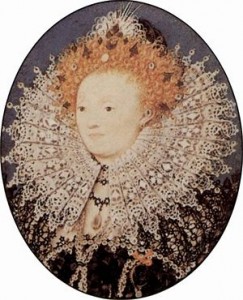
At 3pm on 7th September, less than two weeks after she had taken to her chamber at Greenwich Palace, Queen Anne Boleyn gave birth to a healthy baby girl: Elizabeth, named after grandmothers Elizabeth of York and Elizabeth Howard.
The birth appears to have been straightforward and although Henry VIII must have been disappointed that the baby was a daughter, and not the longed-for son and heir, Elizabeth was “a beautiful infant with natural coloring” who “resembled her father” and was “beautiful perfection”. Elizabeth must surely have given Henry hope that a healthy and perfect son would soon follow.
Elizabeth may have been a disappointment on the day of her birth but she grew up to be a woman and queen both her parents would have been proud of: the iconic Gloriana who heralded in what was said to be a “Golden Age”. She became queen on 17th November 1558 and reigned as Elizabeth I until her death on 24th March 1603. Her main achievements include:
- Becoming queen – She had been made illegitimate by her father Henry VIII and her life had been in the balance during Mary I’s reign when she was linked to uprisings such as the rebellion of Thomas Wyatt the Younger in 1554.
- Defeating the Spanish Aramada in 1588 and the successful raids on the Spaniards at Cadiz.
- Following on from her father’s work on the navy and turning England into a strong and dominant naval power.
- Defending England from Scotland and actually turning the Scots into a permanent ally.
- Increasing literacy in England.
- Expanding England overseas – Elizabeth I encouraged explorers like Sir Walter Ralegh, Sir Francis Drake, Sir John Hawkins and others to discover new places and form colonies.
- Founding the Church of England, as we know it today.
- Raising the status of England abroad.
- Surviving and defeating plots and uprisings against her – These included the Essex rebellion, uprisings in Ireland and the famous Babington plot.
- Helping the poor – Her Poor Laws gave support to those in poverty.
- Ruling England in her own right as Queen without a consort.
- The promotion of the Arts – Her love of arts led to theatres being built and great poets and playwrights like Shakespeare, Spenser and Marlow emerging.
- Turning England round from a poor country riddled with problems to a strong and prosperous country.
- Her patronage of science and the Renaissance way of thinking.
- Her ability to pick excellent advisers like William Cecil and her understanding that a monarch needed to work with advisers and Parliament, to be able to rule successfully.
She was not perfect and many historians question the name “Golden Age” for her reign – her “middle way” of religious policy didn’t really work and Catholics suffered at her hands, there was poverty during her reign, the succession was always an issue and she failed to tackle the problems in Ireland – but there is much to admire about Elizabeth I. Happy birthday Good Queen Bess!